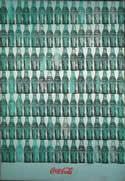Four exhibitions
dal 1/7/2004 al 24/10/2004
Segnalato da
Whitney Museum of American Art
Kenneth Anger
John Baldessari
Will Hindle
David Lamelas
Ed Ruscha
Ana Mendieta
Jasper Johns
Roy Lichtenstein
Claes Oldenburg
Andy Warhol
Joseph Kosuth
Bruce Nauman
Lawrence Weiner
1/7/2004
Four exhibitions
Whitney Museum of American Art, New York
Pop/Concept: Highlights from the Permanent Collection; Ana Mendieta: Earth Body; Lot-Ek: Mobile Dwelling Unit; California Dreaming.

Pop/Concept: Highlights from the Permanent Collection
on view July 1 – October 24, 2004
In the early 1960s, a group of young American artists including Jasper Johns, Roy Lichtenstein, Claes Oldenburg, and Andy Warhol captured the nation's attention with works featuring images drawn directly from popular culture. The seemingly banal subjects and cool, detached techniques pioneered by the Pop artists overshadowed the conceptual attitudes that underlay their work. Conceptualism was seen as the exclusive purview of another group of artists, including Joseph Kosuth, Bruce Nauman, Lawrence Weiner, and the Fluxus artists, who used words and ideas as the materials of their art. This exhibition of works from the Whitney's collection illustrates the aesthetic connections between thees two seemingly divergent groups.
Image:
Andy Warhol, Green Coca-Cola Bottles, 1962
Synthetic polymer, silkscreen ink, and graphite on canvas, 82 3/8 x 57 in. (209.2 x 144.8 cm). Whitney Museum of American Art, New York; purchase, with funds from The Friends of the Whitney Museum of American Art 68.25. © 2004 Andy Warhol Foundation for the Visual Arts/Artists Rights Society (ARS), New York. © The Coca-Cola Company. All Rights Reserved
_________
Ana Mendieta: Earth Body
Sculpture and Performance 1972 - 1985
on view July 1 – September 19, 2004
Ana Mendieta's exploration of the female body and its social and political implications through performances, sculptures, and 'actions' has had a lasting impact on contemporary art. This show, a survey of fifteen years of the exiled Cuban artist's career, includes the well-known Silueta Series, made in Iowa and Mexico from 1973 to 1980, as well as Mendieta's sculptures and installations of the early 1980s. 4th floor, Emily Fisher Landau Galleries. Organized by Olga Viso of the Hirshhorn Museum and Sculpture Garden, where it will premiere in February 2004. Curated at the Whitney by Chrissie Iles.
Ana Mendieta: Earth Body, Sculpture and Performance 1972-1985 was organized by the Hirshhorn Museum and Sculpture Garden, Smithsonian Institution, Washington, DC The exhibition is made possible by The Henry Luce Foundation, the Latino Initiatives Pool, administered by the Smithsonian Center for Latino Initiatives, The Andy Warhol Foundation for the Visual Arts, Bruce T. Halle Family Foundation, and The Judith Rothschild Foundation. Initial research was supported by Craig Robins and a curatorial research fellowship from the Getty Grant Program. Additional support for the exhibition catalogue was made possible through the generosity of Carlos and Rosa de la Cruz and Isabel and Ricardo Ernst.
_________
LOT-EK: Mobile Dwelling Unit
on view July 1 – September 19, 2004
Ada Tolla and Giuseppe Lignano, the founders of the architectural firm LOT/EK (pronounced 'low-tech'), reinvent conventional space with the discarded materials of everyday life, infusing vitality into the Duchampian method of incorporating found objects into one's art. For this installation presented in the Sculpture Court as part of the Contemporary Series, LOT-EK exhibits their architectural prototype, the Mobile Dwelling Unit (MDU), a functional living space converted from a standard shipping container.
Organized by the University Art Museum, University of California, Santa Barbara.
The fabrication of the Mobile Dwelling Unit was made possible by the American Center Foundation. The exhibition and publication were made possible in part through the National Endowment for the Arts, a Federal Agency, and the Italian Cultural Institute.
_________
California Dreaming
on view July 1 – August 22, 2004
Films by Kenneth Anger, John Baldessari, Will Hindle, David Lamelas, and Ed Ruscha
This group of artists' films from the early 1960s to the mid-1970s explores the lifestyle, topography, and mythology of Southern California. Subversive and sometimes mockingly reverential, these counter-narratives address the culture of driving and cars, California cultism, or the pervasive influence of the Hollywood ?lm industry and its stylistic codes.
Scorpio Rising, by Hollywood-born Kenneth Anger, is a homoerotic fantasy revolving around the iconography of motorcycles and leather paraphernalia, accompanied by a soundtrack of 1950s pop music. Ed Ruscha's film Miracle centers on an auto mechanic and his highly sexualized obsession with a car, a theme also explored in Anger's Kustom Kar Kommandos. The titular character of John Baldessari's Ed Henderson Reconstructs Movie Scenarios invents impromptu scenarios based on movie stills, revealing how deeply cinematic narrative and pop culture are ingrained in the American collective unconscious. In Will Hindle's Saint Flournoy Lobos-Logos and the Eastern European Fetus Taxing Japan Brides in West Coast Places Sucking Alabama Air, filmed in Death Valley, a disturbing hallucinatory vision unfolds in the desert, while David Lamelas's The Desert People grafts together the genres of the road-trip movie and documentary as a group of people drives through arid terrain on an ethnographic journey to and from an Indian reservation.
Whitney Museum
945 Madison Avenue 75th Street NY 10021
New York



